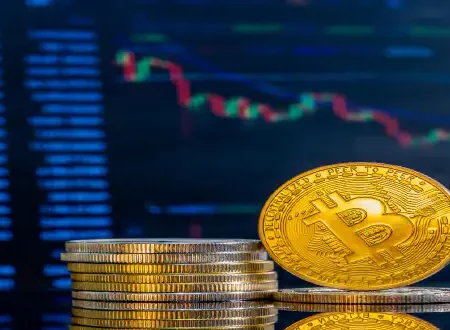Welcome to the comprehensive guide on how to start Bitcoin, the world’s first decentralized digital currency. Whether you are a seasoned investor or a complete beginner, this guide will walk you through the process of getting started with Bitcoin and help you understand the basics of this revolutionary technology.
Bitcoin, created by an anonymous person or group of people known as Satoshi Nakamoto in 2009, has become a global phenomenon that has changed the way we think about money. Unlike traditional currencies, Bitcoin is not controlled by any central authority, such as a government or a bank. Instead, it operates on a peer-to-peer network, allowing individuals to send and receive money directly, without the need for intermediaries.
In this guide, we will cover everything you need to know to start using Bitcoin. We will explain how Bitcoin works, how to buy and store Bitcoin, and how to use it for everyday transactions. We will also cover the potential risks and benefits of investing in Bitcoin, as well as the legal and regulatory considerations.
Whether you are interested in using Bitcoin as a means of payment, investing in it as a long-term asset, or simply exploring the world of cryptocurrencies, this guide will provide you with the knowledge and practical steps to get started. Let’s dive in and discover the exciting world of Bitcoin!
The Origins of Bitcoin: Who Created the World’s First Cryptocurrency?
Bitcoin, the first decentralized digital currency, was created by an anonymous person or group of people using the name Satoshi Nakamoto. The concept of Bitcoin was first introduced in a whitepaper titled “Bitcoin: A Peer-to-Peer Electronic Cash System” published by Nakamoto in 2008.
While the true identity of Satoshi Nakamoto remains a mystery, their work on Bitcoin has had a profound impact on the world of finance and technology. The creation of Bitcoin solved a long-standing problem in the field of digital currencies known as the “double-spending problem”. This refers to the issue of counterfeit currencies or fraudulent transactions in digital payment systems.
The Vision of Bitcoin
Nakamoto envisioned Bitcoin as a completely decentralized system, independent of any central authority such as banks or governments. The goal was to create a peer-to-peer electronic cash system that would allow for secure, direct transactions between parties without the need for intermediaries.
To achieve this, Nakamoto combined various existing technologies and concepts, including cryptography, distributed ledger technology (also known as blockchain), and consensus algorithms. Bitcoin relies on cryptographic techniques to secure transactions and control the creation of new units. The transactions are recorded on a public distributed ledger called the blockchain, which is maintained and verified by a network of participants known as miners.
The Genesis Block and the Early Days
The first block of the Bitcoin blockchain, known as the “genesis block,” was mined by Nakamoto on January 3, 2009. This block contained the message “The Times 03/Jan/2009 Chancellor on brink of second bailout for banks,” which was a reference to a headline from the British newspaper The Times. This message has been interpreted as a commentary on the flaws of the traditional banking system and a statement of Bitcoin’s alternative vision.
In the early days, Bitcoin was not widely known or used. It gained attention from a niche community of enthusiasts and early adopters who saw the potential of this new form of digital currency. The first notable real-world transaction using Bitcoin took place in May 2010 when Laszlo Hanyecz famously bought two pizzas for 10,000 bitcoins. This event is now celebrated as “Bitcoin Pizza Day” and is considered one of the first instances of Bitcoin being used as a medium of exchange.
The Legacy of Bitcoin
Since its creation, Bitcoin has gone on to become the most prominent and influential cryptocurrency in the world. It has inspired the development of thousands of other cryptocurrencies and blockchain-based projects. Bitcoin has also sparked a global movement towards decentralization and financial sovereignty, challenging traditional banking systems and empowering individuals to have greater control over their own finances.
Despite the mystery surrounding the identity of its creator, the impact of Bitcoin on the world of finance and technology is undeniable. Whether Nakamoto’s true identity is ever revealed or not, their creation has left a lasting legacy that continues to shape the future of digital currencies.
Understanding Blockchain Technology: The Foundation of Bitcoin
Blockchain technology is the underlying foundation that powers Bitcoin and many other cryptocurrencies. It is a decentralized and transparent public ledger that records all transactions made with a particular cryptocurrency. Understanding how blockchain technology works is essential to grasp the concept of Bitcoin and its potential impact on various industries.
How Does Blockchain Technology Work?
At its core, a blockchain consists of a chain of blocks that contain digital information. Each block contains a timestamp and a unique identifier, called a hash, which represents the data within the block. The hash is created using complex mathematical algorithms, making it virtually impossible to alter the data within the block without changing all subsequent blocks in the chain.
When a new transaction is made using a cryptocurrency, it is added to a pending pool of transactions. Miners, who are participants in the cryptocurrency network, compete to solve a complex mathematical problem that validates and adds the transactions to the blockchain. This process is known as mining.
Once the mining process is complete, the new block is added to the chain, and the transactions become a permanent part of the blockchain. Each participant in the network has a copy of the blockchain, ensuring transparency and eliminating the need for a centralized authority to verify transactions.
The Benefits of Blockchain Technology
Blockchain technology offers several benefits that make it appealing for various industries:
- Decentralization: The decentralized nature of blockchain technology eliminates the need for intermediaries, such as banks or financial institutions, to facilitate transactions.
- Transparency: Since each participant in the network has a copy of the blockchain, all transactions can be verified and traced, increasing transparency and reducing the potential for fraud.
- Security: The use of complex mathematical algorithms and cryptographic techniques makes blockchain technology highly secure, as altering data within a block would require changing all subsequent blocks.
- Efficiency: Blockchain technology enables faster and more efficient transactions, eliminating the need for manual verification processes and reducing the overall transaction time.
Applications of Blockchain Technology Beyond Bitcoin
While Bitcoin is the most well-known use case for blockchain technology, its potential applications extend far beyond cryptocurrencies. Some of the industries that can benefit from blockchain technology include:
- Financial Services: Blockchain technology can streamline processes such as cross-border payments, settlements, and trade finance, reducing costs and increasing efficiency.
- Supply Chain Management: Blockchain can improve transparency and traceability in supply chains, helping to reduce fraud and counterfeit goods.
- Healthcare: Blockchain technology can securely store and share patient records, ensuring data integrity and improving interoperability between healthcare providers.
- Real Estate: Blockchain can simplify property transactions, reducing the need for intermediaries and making the process more transparent and efficient.
- Government Services: Blockchain technology can enhance the security and transparency of government services, such as voting systems and identity verification.
Understanding blockchain technology is crucial for anyone interested in Bitcoin or emerging technologies in general. Its potential to disrupt various industries and revolutionize established processes makes it an area of study and exploration for businesses, developers, and individuals alike.
Getting Started with Bitcoin: Creating a Wallet and Buying Your First Coins
Bitcoin is a digital currency that allows you to make secure, anonymous transactions online. To get started with Bitcoin, you’ll need to create a Bitcoin wallet and purchase your first coins. Here’s a step-by-step guide to help you get started:
Step 1: Choose a Bitcoin Wallet
The first thing you’ll need to do is choose a Bitcoin wallet. A Bitcoin wallet is a digital wallet that allows you to store, send, and receive bitcoins. There are different types of wallets, including online wallets, desktop wallets, and hardware wallets. Each type has its own advantages and security features, so it’s important to choose the one that suits your needs.
Step 2: Set Up Your Bitcoin Wallet
Once you’ve chosen a wallet, you’ll need to set it up. This usually involves creating a username and password, and sometimes providing additional verification information. Make sure to choose a strong password and enable two-factor authentication if it’s available. This will help protect your funds from unauthorized access.
Step 3: Get Your Bitcoin Address
After setting up your wallet, you’ll be assigned a unique Bitcoin address. This address is similar to a bank account number and is used to receive bitcoins from others. You can share your Bitcoin address with others to receive payments or use it to buy bitcoins.
Step 4: Buy Bitcoins
Now that you have a wallet and a Bitcoin address, it’s time to buy your first bitcoins. There are several ways to buy bitcoins, including:
- Exchanges: Bitcoin exchanges allow you to buy and sell bitcoins using different currencies. You’ll need to create an account, provide your personal information, and sometimes complete a verification process. Once your account is set up, you can deposit funds and place an order to buy bitcoins.
- Peer-to-peer: Peer-to-peer platforms connect buyers and sellers directly. You can find sellers who are willing to accept cash, bank transfers, or other payment methods in exchange for bitcoins. These platforms usually provide escrow services to ensure a secure transaction.
- Bitcoin ATMs: Bitcoin ATMs are physical machines that allow you to buy bitcoins with cash. You can find Bitcoin ATMs in various locations and simply insert cash to purchase bitcoins. The bitcoins will be sent directly to your wallet.
- Bitcoin brokers: Bitcoin brokers act as intermediaries between buyers and sellers. They provide a platform where you can place an order to buy bitcoins at a specific price. The broker will then find a seller who is willing to sell bitcoins at that price and facilitate the transaction.
Choose the method that’s most convenient for you and follow the instructions to complete the purchase.
Step 5: Secure Your Bitcoins
After buying your bitcoins, it’s important to take steps to secure them. Remember that your Bitcoin wallet is like a digital bank account, so you should treat it with the same level of security. Here are a few tips:
- Backup your wallet: Make sure to regularly backup your wallet and keep multiple copies in different locations. This will help you recover your funds in case your wallet gets lost or damaged.
- Enable two-factor authentication: Two-factor authentication adds an extra layer of security to your wallet. It requires you to provide a second verification method, such as a unique code generated by a mobile app, in addition to your password.
- Use secure devices: Avoid accessing your Bitcoin wallet on public computers or unsecured networks. Use secure devices, such as your personal computer or a hardware wallet, to minimize the risk of unauthorized access.
- Keep your wallet software up to date: Wallet software updates often include security patches and bug fixes. Make sure to regularly update your wallet software to stay protected against the latest threats.
By following these steps, you’ll be well on your way to getting started with Bitcoin. Remember to do your own research and exercise caution when buying and storing bitcoins, as the cryptocurrency market can be volatile and there are risks involved.
| Pros | Cons |
|---|---|
|
|
Securing Your Bitcoin: Best Practices for Keeping Your Digital Assets Safe
When it comes to owning and storing Bitcoin, security should be your utmost priority. Since Bitcoin transactions are irreversible and the fact that it’s a digital currency, it’s important to take necessary precautions to keep your digital assets safe from theft or loss. Here are some best practices to help secure your Bitcoin:
1. Use a Hardware Wallet
One of the safest ways to store your Bitcoin is by using a hardware wallet. Hardware wallets are physical devices that store your private keys offline, making them less susceptible to hacking or malware attacks. Make sure to choose a reliable hardware wallet from reputable manufacturers.
2. Enable Two-Factor Authentication (2FA)
When setting up accounts that involve your Bitcoin, such as exchange accounts or online wallets, enable two-factor authentication (2FA). This adds an extra layer of security by requiring an additional code (usually sent to your mobile device) to access your account.
3. Use Strong and Unique Passwords
Always use strong passwords that are unique to each account associated with your Bitcoin. Avoid using common words or phrases and consider using a password manager to generate and store complex passwords securely.
4. Keep Your Software Updated
Regularly update your Bitcoin wallet software and any other software or applications that you use to interact with your Bitcoin. These updates often contain important security patches, bug fixes, and improvements.
5. Backup Your Wallet
Make regular backups of your Bitcoin wallet. Store these backups in multiple secure locations, such as encrypted USB drives or offline paper wallets. This ensures that even if your computer or hardware wallet gets lost or damaged, you can still recover your Bitcoin.
6. Be Wary of Phishing Attempts
Be cautious of phishing attempts, where scammers impersonate legitimate websites or services to trick you into revealing your private information. Always double-check the URL of the website you’re visiting and never click on suspicious links in emails or messages.
7. Use Multi-Signature (Multi-Sig) Wallets
Consider using multi-signature wallets, which require multiple signatures or approvals to complete a transaction. This provides an added layer of security by reducing the risk of a single point of failure.
8. Store Bitcoin Offline
Consider storing a significant portion of your Bitcoin offline in cold storage. Cold storage refers to keeping your private keys offline and away from any internet-connected devices, making it less vulnerable to hacking or malware attacks.
9. Educate Yourself
Continuously educate yourself about the latest Bitcoin security best practices and stay updated on potential vulnerabilities or attacks. By staying informed, you can better protect your digital assets and make informed decisions.
10. Be Mindful of Public Wi-Fi Networks
Avoid accessing your Bitcoin-related accounts or making Bitcoin transactions while connected to public Wi-Fi networks. Public Wi-Fi networks can be easily compromised and expose your sensitive information to potential hackers.
By following these best practices and staying vigilant, you can enhance the security of your Bitcoin holdings and minimize the risk of losing your digital assets.
Bitcoin Mining: How to Earn Bitcoins by Verifying Transactions
Bitcoin mining is the process of adding and verifying transactions to the blockchain, the public ledger of all Bitcoin transactions. Miners use powerful computers to solve complex mathematical problems that validate and secure these transactions. In return for their efforts, miners are rewarded with newly generated bitcoins.
Here are the steps to start bitcoin mining:
- Get a Bitcoin Mining Hardware: To mine bitcoins, you need specialized hardware called ASICs (Application-Specific Integrated Circuits). These devices are designed specifically for mining and offer better performance and efficiency compared to traditional CPUs or GPUs.
- Choose a Mining Pool: Mining alone can be difficult and may not yield consistent results. Joining a mining pool allows you to combine your computing power with other miners and increase your chances of earning bitcoins. When a block is successfully mined, the rewards are distributed among the participants based on their contributions.
- Set Up a Bitcoin Wallet: You will need a Bitcoin wallet to receive and store the bitcoins you earn from mining. There are different types of wallets available, including software wallets, hardware wallets, and online wallets. Choose a wallet that suits your needs and ensure it is secure.
- Download Mining Software: Once you have a mining hardware and a wallet, you need to download and configure mining software. The software connects your mining hardware to the Bitcoin network and enables you to control and monitor your mining operations.
- Join the Mining Pool: After setting up the mining software, you need to join a mining pool of your choice. Most mining pools have their own software, which you can download and configure to connect to the pool. Provide your mining pool address, username, and password to start mining.
- Start Mining: Once everything is set up and connected, you can start mining. The mining software will use your mining hardware to solve mathematical problems, verifying and adding transactions to the blockchain. As a reward for the successful mining, you will receive bitcoins directly into your wallet.
It’s important to note that bitcoin mining requires a significant amount of computational power and energy. It can be a competitive and resource-intensive process, and the profitability of mining depends on various factors such as the price of bitcoin, the cost of electricity, and the efficiency of your mining hardware.
Additionally, as the Bitcoin network has grown over time, the difficulty of mining has increased, requiring more powerful hardware to mine effectively. This means that mining bitcoins may not be as profitable for individuals with limited resources.
Before getting into bitcoin mining, it’s essential to do thorough research, understand the costs and potential returns, and consider alternative options such as cloud mining or investing in bitcoin directly.
| Pros | Cons |
|---|---|
| Opportunity to earn bitcoins | High startup and ongoing costs |
| Supports the Bitcoin network | Increased difficulty over time |
| Potential for profits if done right | Energy-intensive process |
| Joining a mining pool increases chances of earning | Competition from large-scale mining operations |
Bitcoin Exchanges: Where to Buy, Sell, and Trade Bitcoin
Bitcoin exchanges are platforms where you can buy, sell, and trade Bitcoin. These exchanges act as intermediaries that facilitate transactions between buyers and sellers of Bitcoin.
1. Coinbase
Coinbase is one of the most popular Bitcoin exchanges for beginners. It is user-friendly and offers a simple and secure way to buy, sell, and store Bitcoin. Coinbase also provides a digital wallet for you to securely store your Bitcoin.
2. Binance
Binance is a global cryptocurrency exchange that offers a wide range of cryptocurrencies, including Bitcoin. It has a user-friendly interface and provides advanced trading features. Binance also offers a digital wallet for storing your Bitcoin and other cryptocurrencies.
3. Kraken
Kraken is a reputable Bitcoin exchange known for its security and transparency. It offers advanced trading features and supports various fiat currencies. Kraken also provides a digital wallet for storing your Bitcoin securely.
4. Bitstamp
Bitstamp is one of the oldest Bitcoin exchanges and is known for its reliability and security. It offers a simple and intuitive platform for buying, selling, and trading Bitcoin. Bitstamp also provides a digital wallet for storing your Bitcoin.
5. Gemini
Gemini is a regulated Bitcoin exchange based in the United States. It offers a secure platform for buying, selling, and trading Bitcoin. Gemini also provides a digital wallet for storing your Bitcoin.
6. LocalBitcoins
LocalBitcoins is a peer-to-peer Bitcoin exchange that allows you to buy and sell Bitcoin directly with other users. It offers a variety of payment methods and allows for more privacy compared to other exchanges.
7. Bitfinex
Bitfinex is a popular Bitcoin exchange known for its advanced trading features and liquidity. It offers a wide range of trading options and supports various fiat currencies. Bitfinex also provides a digital wallet for storing your Bitcoin.
8. Coinmama
Coinmama is a Bitcoin exchange that allows you to buy Bitcoin with a credit card or debit card. It has a user-friendly interface and offers fast transactions. Coinmama also provides a digital wallet for storing your Bitcoin.
Conclusion
Choosing the right Bitcoin exchange is crucial for buying, selling, and trading Bitcoin. Consider factors such as security, user-friendliness, fees, and available features when selecting an exchange. It is also important to store your Bitcoin in a secure digital wallet to protect your investment.
Using Bitcoin for Everyday Transactions: How to Spend Your Cryptocurrency
Bitcoin is becoming more widely accepted as a method of payment for everyday purchases. Here are some steps you can follow to start spending your Bitcoin:
1. Choose a Bitcoin Wallet
Before you can start spending Bitcoin, you need to have a Bitcoin wallet. There are various types of wallets available, including software wallets, hardware wallets, and online wallets. Choose a wallet that suits your needs and ensure it supports the ability to send and receive Bitcoin.
2. Acquire Bitcoin
In order to spend Bitcoin, you need to acquire it first. There are several ways to acquire Bitcoin, including:
- Purchasing Bitcoin from a cryptocurrency exchange by trading it for fiat currency
- Accepting Bitcoin as payment for goods or services
- Mining Bitcoin by contributing computing power to the network
3. Find Bitcoin-Accepting Merchants
Search for merchants or online platforms that accept Bitcoin as a form of payment. There are numerous websites and directories available that provide a list of Bitcoin-accepting businesses. Some popular online platforms accepting Bitcoin include major retailers, travel agencies, and online marketplaces.
4. Pay with Bitcoin
Once you’ve found a merchant that accepts Bitcoin, you can proceed with making a payment. Here’s how:
- Open your Bitcoin wallet and navigate to the “Send” or “Send Bitcoin” section.
- Enter the recipient’s Bitcoin address or scan their QR code.
- Specify the amount of Bitcoin you want to send.
- Review the transaction details and confirm the payment.
5. Consider Transaction Fees
When making a Bitcoin transaction, it’s important to consider the associated transaction fees. Bitcoin transactions typically involve a small fee, which is paid to miners who process the transactions.
6. Keep Track of Your Transactions
It’s essential to keep track of your Bitcoin transactions for record-keeping and security purposes. You can use your Bitcoin wallet or a separate portfolio tracker to monitor your spending and balance.
7. Be Mindful of Security
When using Bitcoin for everyday transactions, it’s important to prioritize security. Make sure to keep your wallet software up to date, enable two-factor authentication, and use strong, unique passwords. Additionally, be cautious of phishing attempts and avoid sharing your private keys or seed phrases with anyone.
| Pros | Cons |
|---|---|
|
|
Bitcoin Taxation: Understanding the Legal and Tax Implications of Bitcoin
As the popularity of Bitcoin grows, so does the need for individuals to understand the legal and tax implications of using and investing in this digital currency. In many countries, Bitcoin is considered a form of property or asset, which means it is subject to taxation.
Legal Status of Bitcoin
The legal status of Bitcoin varies from country to country. In some jurisdictions, Bitcoin is recognized as a legal currency and can be used for everyday transactions. In others, it is considered an asset, similar to stocks or bonds.
It is important to research and understand the legal status of Bitcoin in your country or region to ensure compliance with the law.
Taxation of Bitcoin
Bitcoin taxation can be complex, as it involves both capital gains tax and income tax considerations. The specific tax implications of Bitcoin will depend on your country’s tax laws and regulations.
Some countries treat Bitcoin as a capital asset, subjecting it to capital gains tax when it is sold or used for purchasing goods or services. Others may consider it as income, in which case it is subject to income tax.
When it comes to reporting Bitcoin transactions, it is important to keep accurate records of all your transactions, including the date, amount, and purpose. Failure to report Bitcoin transactions properly can result in penalties and legal consequences.
Regulatory Requirements
Various regulatory requirements may apply to individuals and businesses using or trading Bitcoin. These can include licensing, registration, and reporting obligations.
Some countries have implemented strict Know Your Customer (KYC) and Anti-Money Laundering (AML) regulations to combat illegal activities associated with cryptocurrencies.
Seek Professional Advice
Given the complex and evolving nature of Bitcoin taxation, it is advisable to seek professional advice from a tax professional or accountant who specializes in cryptocurrency taxation.
A tax professional can help you understand your obligations, navigate the reporting requirements, and ensure compliance with the tax laws in your country.
Remember, tax laws can change, and failure to comply with tax regulations can result in financial penalties and legal consequences. Stay informed, keep accurate records, and seek professional advice to ensure a smooth and compliant experience with Bitcoin.
Investing in Bitcoin: Tips for Building a Profitable Crypto Portfolio
Investing in Bitcoin can be a profitable venture, but it’s important to approach it with a strategic mindset. Building a diversified crypto portfolio can help mitigate risk and maximize potential returns. Here are some tips to consider when investing in Bitcoin:
1. Do your research
Before investing in Bitcoin, it’s crucial to do thorough research and understand the fundamentals of the cryptocurrency market. Familiarize yourself with the technology behind Bitcoin, its historical price movements, and the factors that can influence its value.
2. Diversify your portfolio
Diversification is key to building a profitable crypto portfolio. Instead of investing all your funds in Bitcoin alone, consider allocating a portion of your investment to other cryptocurrencies with strong potential. This can help spread the risk and increase your chances of capitalizing on different market trends.
3. Set a budget
Investing in Bitcoin can be exciting, but it’s important to set a budget and stick to it. Determine the amount you are willing to invest and only use funds that you can afford to lose. This will help prevent emotional decision-making and ensure that your investments are aligned with your financial goals.
4. Use a reputable exchange
When buying Bitcoin, choose a reputable cryptocurrency exchange with a secure platform and a good track record. Research different exchanges, read user reviews, and consider factors such as fees, security measures, and customer support. This will help ensure that your investments are safe and that you have a seamless trading experience.
5. Take a long-term approach
Bitcoin can be volatile in the short term, but taking a long-term approach to investing can help ride out market fluctuations and potentially generate higher returns. Avoid making impulsive decisions based on short-term price movements and focus on the long-term potential of Bitcoin as a store of value and medium of exchange.
6. Set realistic expectations
While Bitcoin has the potential for significant gains, it’s important to set realistic expectations and not get carried away by hype. Avoid investing based solely on FOMO (fear of missing out) and be prepared for market downturns. Remember that investing in Bitcoin carries risks, and it’s important to be mentally prepared for both potential gains and losses.
7. Stay informed
Stay updated with the latest news and developments in the cryptocurrency market. Join online communities, follow reputable crypto influencers and news sources, and regularly review your portfolio to ensure it aligns with your investment strategy. Being informed can help you make educated investment decisions and adapt to changing market conditions.
8. Consider dollar-cost averaging
Dollar-cost averaging is an investment strategy where you invest a fixed amount in Bitcoin at regular intervals, regardless of its price. This approach can help mitigate the impact of short-term price volatility and potentially result in lower average purchase prices over time.
9. Secure your investments
Security is paramount when it comes to investing in Bitcoin. Use strong, unique passwords for your exchange accounts, enable two-factor authentication, and consider storing your Bitcoin in a hardware wallet or a secure digital wallet. Regularly update your software and stay vigilant against potential scams and phishing attempts.
10. Consult with a financial advisor
If you’re new to investing or unsure about the best approach to building a profitable crypto portfolio, consider consulting with a qualified financial advisor. They can provide personalized guidance based on your financial goals, risk tolerance, and investment horizon.
By following these tips and staying disciplined, you can increase your chances of building a profitable Bitcoin portfolio. Remember that investing in Bitcoin involves risks, and it’s important to make informed decisions based on your own research and financial situation.
Alternative Cryptocurrencies: Exploring Other Digital Assets Besides Bitcoin
Bitcoin may be the most well-known and widely-used cryptocurrency, but it is not the only one. There are thousands of alternative cryptocurrencies, also known as altcoins, that have emerged in recent years. These altcoins offer unique features and functionalities that make them attractive to different types of investors and users.
Here are some of the most popular alternative cryptocurrencies:
- Ethereum (ETH): Ethereum is the second-largest cryptocurrency by market capitalization after Bitcoin. It is known for its smart contract functionality, which allows developers to build decentralized applications (DApps) on the Ethereum blockchain.
- Ripple (XRP): Ripple is a digital payment protocol and cryptocurrency that aims to enable fast, low-cost international money transfers. It has gained popularity among banks and financial institutions for its ability to settle transactions quickly.
- Litecoin (LTC): Litecoin is often referred to as the silver to Bitcoin’s gold. It was created as a faster and lighter version of Bitcoin, with quicker block generation times and a different hashing algorithm.
- Bitcoin Cash (BCH): Bitcoin Cash is a fork of Bitcoin that was created to address scalability issues. It has larger block sizes, allowing for more transactions to be processed at once.
These are just a few examples of the many altcoins available in the cryptocurrency market. Each altcoin has its own unique features and use cases, and it is important to carefully research and understand them before investing.
Factors to Consider When Choosing an Altcoin
When evaluating different altcoins, there are several factors to consider:
- Use case: Does the altcoin solve a real-world problem or fill a specific niche?
- Team: Who is behind the altcoin? Do they have a strong track record and relevant experience?
- Technology: What is the underlying technology of the altcoin? Is it secure and scalable?
- Market demand: Is there a demand for the altcoin? Is it being adopted by users and investors?
- Community: Is there an active and supportive community surrounding the altcoin? Community engagement is crucial for the long-term success of a cryptocurrency.
It’s important to note that investing in altcoins can be more risky than investing in Bitcoin. Altcoins tend to be more volatile and have a higher risk of failure. As with any investment, it is crucial to do your own research and consult with a financial advisor before making any decisions.
Conclusion
While Bitcoin remains the dominant cryptocurrency, there are many alternative cryptocurrencies that offer unique features and opportunities immediate edge. Exploring and understanding these altcoins can provide investors with a wider range of options and potentially higher returns. However, it is important to proceed with caution and conduct thorough research before investing in any cryptocurrency.
The Future of Bitcoin: Predictions and Trends for the Global Cryptocurrency
Bitcoin, the world’s first decentralized cryptocurrency, has captured the attention of investors, tech enthusiasts, and even governments. Since its inception in 2009, Bitcoin has experienced significant growth and has revolutionized the way we think about money and transactions. As we look towards the future, it’s essential to consider the trends and predictions that may shape the future of Bitcoin and the global cryptocurrency market.
1. Increasing Adoption
One of the most significant trends in the future of Bitcoin is the increasing adoption of cryptocurrencies worldwide. As people gain a better understanding of Bitcoin’s advantages, such as decentralization, security, and lower fees, more individuals and businesses are likely to embrace it. This adoption will drive the demand for Bitcoin and increase its overall value.
2. Institutional Investment
In recent years, we have witnessed a growing interest from institutional investors in Bitcoin. Hedge funds, banks, and other financial institutions have started to explore Bitcoin as a potential investment asset. This institutional investment not only brings credibility but also contributes to the stability and liquidity of the cryptocurrency market. As more institutions invest in Bitcoin, its value is likely to increase further.
3. Regulatory Landscape
The regulatory landscape surrounding Bitcoin is continuously evolving. Governments around the world are becoming more aware of the need to create a legal framework for cryptocurrencies. While regulations may introduce some constraints, they will ultimately provide clarity and stability for investors and businesses operating in the cryptocurrency space. The future of Bitcoin will depend on how regulators strike a balance between innovation and consumer protection.
4. Technological Advancements
As Bitcoin continues to evolve, so does the technology that supports it. Innovations such as the Lightning Network, which improves transaction speed and scalability, and advancements in privacy features, will make Bitcoin even more attractive for everyday use. These technological advancements will enhance Bitcoin’s functionality and increase its potential to become a widely accepted means of payment.
5. Global Economic Uncertainty
Bitcoin’s future is closely intertwined with global economic uncertainty. In times of economic instability, people often turn to alternative assets such as gold and Bitcoin to preserve their wealth. As the global economy faces challenges like inflation, political instability, and trade disputes, Bitcoin’s appeal as a safe haven asset is likely to grow. This increased demand could drive up the price of Bitcoin in the future.
Conclusion
The future of Bitcoin holds great potential as more individuals, businesses, and institutions recognize its benefits. With increasing adoption, institutional investment, evolving regulations, technological advancements, and global economic uncertainty, Bitcoin is well-positioned to continue growing and shaping the future of the global cryptocurrency market.









This article provides a comprehensive guide for beginners on how to start with Bitcoin. As a female reader, I found the information to be very informative and easy to understand. The article begins by explaining what Bitcoin is and its potential benefits. It then outlines the step-by-step process of getting started with Bitcoin, including choosing a Bitcoin wallet, registering on a cryptocurrency exchange, and securing one’s account with two-factor authentication. The article also emphasizes the importance of understanding the risks associated with Bitcoin and recommends doing thorough research before investing in it. Additionally, it highlights some popular Bitcoin wallets and exchanges for beginners to consider. Overall, this article is a valuable resource for someone like me who is new to Bitcoin and looking for a user-friendly guide to get started.
I found this “How to Start Bitcoin: A Complete Guide for Beginners” article very informative and helpful. As a woman interested in venturing into the world of cryptocurrencies, I appreciated the detailed explanations and step-by-step instructions provided. The article did a great job of breaking down complex concepts like blockchain technology and mining into simple terms that were easy to understand. I was particularly grateful for the tips on choosing a reliable Bitcoin wallet and secure exchanges for buying and selling Bitcoin. The article emphasized the importance of doing thorough research and exercising caution in the cryptocurrency space, which I found reassuring as a beginner. Additionally, the section on Bitcoin mining was enlightening. It explained how mining works and the hardware requirements, which I had always been curious about. The article also mentioned alternative ways to earn Bitcoin, such as by participating in airdrops or completing microtasks. This expanded my understanding of the various opportunities in the Bitcoin ecosystem. Overall, I would highly recommend this guide to anyone who wants to start their Bitcoin journey. It’s a comprehensive resource that covers all the essential information and considerations for beginners. I feel more confident and excited to explore the world of Bitcoin after reading this article.
This guide is a great resource for beginners like me who are interested in starting with Bitcoin. The author explains the basics of Bitcoin in a clear and concise manner. I appreciate the step-by-step instructions on how to set up a Bitcoin wallet and purchase Bitcoin. The guide also provides valuable information on how to store and secure Bitcoin. As someone who is new to cryptocurrency, I found the explanations of key concepts such as blockchain and mining to be very helpful. The guide also addresses common concerns and provides tips for avoiding scams. Overall, this article has given me the confidence to start my Bitcoin journey. I highly recommend it to anyone interested in getting started with Bitcoin.
I found this article on how to start Bitcoin fascinating and easy to follow, especially for someone like me who is new to the world of cryptocurrency. The author provides a comprehensive guide that breaks down the steps in a clear and concise manner. The article begins by explaining what Bitcoin is and why it has gained so much popularity. I appreciated how the author highlighted the benefits of investing in Bitcoin and the potential for high returns. The guide then moves on to the practical steps of getting started with Bitcoin. The author explains how to set up a wallet, which is essential for storing and managing Bitcoin. He also provides recommendations for reputable wallet providers, giving me confidence in the security of my investment. Furthermore, the article walks me through the process of buying Bitcoin, from choosing a reputable exchange platform to executing the purchase successfully. I found the step-by-step instructions and screenshots particularly helpful, as they made the whole process less intimidating. One aspect that sets this article apart is the emphasis on security and protecting one’s investment. The author discusses the importance of secure passwords, two-factor authentication, and even cold storage options. As a beginner, these tips were invaluable and made me feel more confident about venturing into the Bitcoin market. In conclusion, this article serves as an excellent guide for beginners looking to start their Bitcoin journey. It provides a clear and comprehensive overview, covering everything from understanding the basics of Bitcoin to actually buying and securely storing it. I would highly recommend this article to anyone interested in exploring the world of cryptocurrency.
The article “How to Start Bitcoin: A Complete Guide for Beginners” is a comprehensive and easy-to-understand resource for anyone who is new to the world of Bitcoin. As a female reader, I appreciate the clear and concise explanations provided in the guide, which make it accessible to those with little to no prior knowledge of cryptocurrency. I found the step-by-step instructions particularly helpful in understanding how to get started with Bitcoin. The guide covers everything from setting up a digital wallet to buying and selling Bitcoin, making it a one-stop resource for beginners like myself. The inclusion of screenshots and illustrations further enhances the user experience and helps to streamline the learning process. Another aspect that I found beneficial was the section on security measures. The guide emphasizes the importance of protecting one’s Bitcoin investments and provides practical tips on how to do so. I appreciate the emphasis on strong passwords and the recommendation to enable two-factor authentication, as these measures are crucial in safeguarding personal information and digital assets. Overall, “How to Start Bitcoin: A Complete Guide for Beginners” has proven to be an invaluable resource for me as I navigate the world of cryptocurrency. It has provided me with the knowledge and confidence to begin my Bitcoin journey, and I would highly recommend it to anyone who is looking to do the same.
I found this article on “How to Start Bitcoin: A Complete Guide for Beginners” incredibly informative and well-written. As a male reader, I have always been intrigued by the concept of Bitcoin and cryptocurrency, but I never knew where to begin. This guide provided a step-by-step explanation of how to get started, from setting up a digital wallet to purchasing Bitcoin. I appreciated the author’s clear and concise explanations, which made it easy for someone like me who is new to the world of Bitcoin to understand. The article also mentioned the importance of doing thorough research and understanding the risks involved in investing in Bitcoin, which I found very helpful. One aspect of the article that stood out to me was the emphasis on security. The author provided tips on how to protect one’s Bitcoin investments, such as using two-factor authentication and keeping personal information secure. This reassured me that Bitcoin can be a safe investment option if approached with caution. Overall, this article served as an excellent guide for beginners like myself who are interested in starting with Bitcoin. It answered many of my questions and provided a clear roadmap for getting started. I would highly recommend this article to anyone looking to dip their toes into the world of Bitcoin.